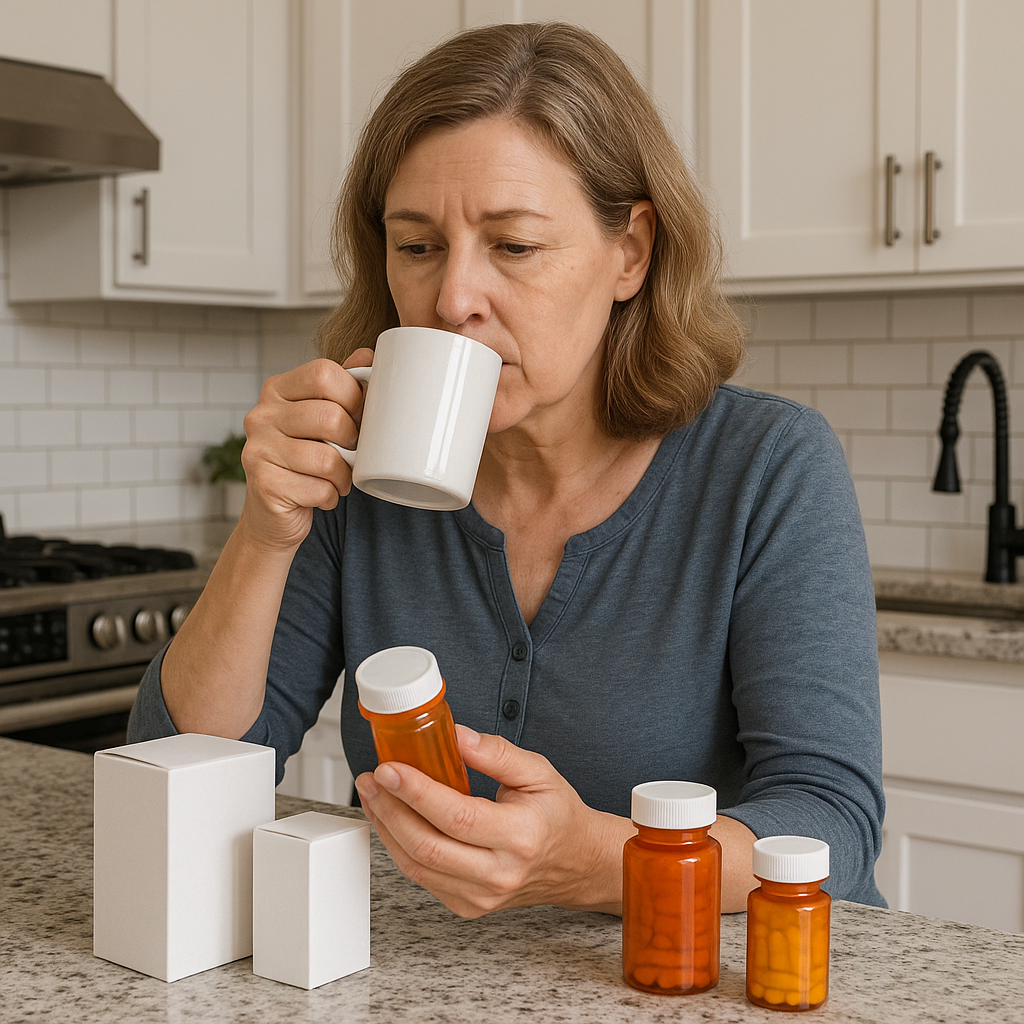Author

Inflexxion Health
If you’ve noticed changes in your sex drive during perimenopause or menopause, you’re not imagining things, and you’re not alone. Many women describe this time of life as confusing, sometimes frustrating, and often surprising. For some, desire fades. For others, pain or dryness make intimacy less enjoyable. And a few even report an unexpected increase in libido. No matter your experience, it’s real, it’s valid, and it deserves understanding and support.
At Inflexxion Health, we believe that your sexual wellbeing is an important part of your overall health. With telehealth care, you don’t have to navigate these changes in silence. You can get help, right from your home. Reaching out is not only about restoring intimacy, but also about improving your quality of life. Intimacy and sexuality are deeply connected to overall wellness, mood, and even sleep, which is why they should be addressed with the same care as other health concerns. You deserve the opportunity to enjoy closeness and connection without fear or discomfort, and with the right tools, this is possible.
Why Sex Drive Changes During Menopause
Hormonal Shifts
Hormones play a major role in sexual function. During perimenopause and menopause, estrogen levels drop, and so do androgens (such as testosterone). This shift affects the brain’s signaling of desire and arousal as well as the body’s physical readiness for intimacy. Research from the North American Menopause Society confirms that reduced estrogen and testosterone can directly contribute to lower sexual desire, decreased arousal, and fewer satisfying sexual experiences (The North American Menopause Society, 2019).
Quick Definition: Androgens are hormones, like testosterone, that help regulate sexual desire, energy, and muscle mass in both men and women.
When testosterone levels fall, some women notice a dramatic decline in libido, while others report a more subtle shift, like needing more mental or physical stimulation to feel aroused. It’s important to know that these changes are normal, not a reflection of your worth, your attractiveness, or your ability to connect with your partner. While normal, you don’t have to accept these changes as inevitable parts of getting older. Understanding the role of hormones gives you a clearer picture of why these changes happen and helps reduce the self-blame many women feel. By recognizing the biology behind libido shifts, you can approach treatment and conversations with your provider from a place of knowledge and confidence. This awareness also empowers you to explain your experiences to your partner, making it easier to maintain closeness and empathy in your relationship.
Vaginal Changes
Another major factor is Genitourinary Syndrome of Menopause (GSM), a collection of symptoms that includes vaginal dryness, thinning of the vaginal walls, irritation, and pain with sex (dyspareunia). According to a JAMA Internal Medicine study, GSM is extremely common, affecting more than half of postmenopausal women (Grady, et al., 2003). A review also confirms that systemic and local estrogen therapies can restore comfort and improve sexual health (Jaisamrarn, 2021).
GSM Explained: Genitourinary Syndrome of Menopause (GSM) is the medical term for a set of symptoms related to low estrogen levels in menopause that affect the vagina and urinary tract. These include dryness, irritation, burning, painful sex, and sometimes urinary urgency or infections.
Because many women don’t realize GSM is treatable, they often assume discomfort is something they have to live with. That’s simply not true, there are safe and effective treatments that can restore comfort and pleasure. Talking openly with a provider about GSM can be life-changing, as addressing these symptoms not only improves intimacy but also daily comfort. Women often find that when vaginal health is restored, their confidence and sense of wellbeing increase dramatically. In fact, many who start treatment later in life express regret that they suffered in silence for so long when help was available.
Emotional and Relational Factors
Menopause doesn’t just change the body; it also affects emotions and relationships. The Journal of Menopausal Medicine highlights that sexual problems during menopause are many, meaning they involve both physical and emotional components (Shifren & Gass, 2019). Stress, anxiety, or low mood can all dampen desire. Relationship quality matters too. If a partner misunderstands the changes or takes them personally, intimacy can become more stressful than enjoyable.
Many women say that they avoid sex out of fear of hurting their partner’s feelings, which adds another layer of guilt or sadness. This cycle can make intimacy feel like a burden instead of a source of connection. Understanding that emotional wellbeing is just as important as hormonal balance helps shift the way women and their partners view these changes. Couples who approach menopause as a shared journey often find more resilience and closeness in the process. Open communication and empathy allow both partners to adapt and find new ways to connect.
The Human Side: What Women Are Saying
Relationship Tension
One of the most common concerns expressed in forums and support groups is relationship strain. Women often feel torn between their own discomfort and their partner’s needs:
“My partner thinks I’m rejecting him, but the truth is, sex has become painful and I just don’t feel like myself anymore.”
This statement reflects the misunderstanding many couples face. Without open conversations, partners may feel unloved, while women may feel pressured or guilty. These experiences highlight how essential it is to involve partners in discussions about menopause and sexual health. Educating both partners reduces blame and creates space for compassion. When partners understand that these changes are biological, not personal, they are more likely to respond with patience, support, and willingness to try solutions together.
Pain and Fear
Physical pain changes everything. Many women describe fear of intimacy—not because they don’t love their partner, but because they anticipate pain:
“I dread sex because it hurts every time, and then I feel guilty. I miss how things used to be.”
This cycle creates emotional distance. What’s important to know is that pain is treatable. With the right support, you don’t have to choose between avoiding intimacy and enduring discomfort. Addressing pain early can prevent the cycle of avoidance and guilt from becoming deeply ingrained. Even small improvements, such as using lubricants or vaginal estrogen, can dramatically change a woman’s experience and outlook. Over time, reducing pain not only restores comfort but can also reignite desire, since intimacy is no longer associated with suffering.
Self-Image
Menopause can affect how women see themselves. Beyond the physical symptoms, many feel less confident or worry that they’ve lost part of their identity:
“I feel broken… like I’m not the same woman I was.”
. The good news is that treatments not only improve physical symptoms but also help restore confidence, joy, and self-esteem. Many women who start treatment later say they wish they had sought help sooner. Rebuilding self-image often begins with small steps, such as improving comfort during intimacy or addressing vaginal health. As women experience improvements, they often begin to see themselves as whole and vibrant again. Restoring confidence in this way ripples out into other areas of life, from relationships to career to personal growth.
Sleep Deprivation and Lower Sex Drive
For many women, poor sleep and low desire go hand in hand. Hot flashes, night sweats, and hormonal changes can leave you exhausted.
When your body is running on empty, sex is often the first thing to fall off the list. Fatigue lowers interest, dampens mood, and makes it harder to feel connected. This can create frustration for both partners, especially when women feel guilty about their lack of drive. The hopeful news is that restoring hormones with systemic estrogen often improves sleep, which in turn restores energy and desire. As rest returns, many women notice that their natural interest in intimacy begins to come back too.
Treatment Options That Work
Hormone Therapy (HRT)
Hormone Replacement Therapy (HRT) is one of the most effective treatments for menopause symptoms, including sexual health changes. Estrogen therapy can restore vaginal tissue health, reduce dryness, and make sex more comfortable. When testosterone is added in carefully chosen cases, studies show clear improvements in sexual desire, arousal, and satisfaction (Davison et al., 2019).
Safety Note: Testosterone for women is prescribed in much lower doses than for men and is monitored carefully by healthcare providers. When used appropriately, it can be safe and effective. This option can be especially helpful for women whose primary concern is loss of desire rather than physical pain. The addition of testosterone may restore not only sexual desire but also energy levels and vitality. Women often report that this treatment feels like “getting a piece of themselves back,” which can improve mood, relationships, and confidence.
Local Estrogen
If you prefer not to use systemic HRT, local estrogen therapy may be a good option. This includes vaginal creams, tablets, or rings that deliver estrogen directly to the vaginal tissue. Local estrogen is highly effective for relieving dryness and pain and has very low absorption into the rest of the body, making it safe for many women (Jaisamrarn, 2021). Local estrogen works by thickening the vaginal lining, restoring elasticity, and increasing natural lubrication. Many women notice improvement within weeks, with continued benefits over time. Unlike lubricants, which provide temporary relief, local estrogen addresses the root cause of GSM by replenishing estrogen where it’s needed most.
Non-Hormonal Supports
Not every woman can or wants to use hormones. Fortunately, there are other effective options:
- Lubricants: Used during intimacy to reduce friction and discomfort. Water-based, silicone-based, or hybrid lubricants are widely available and safe to use. Choosing the right product can make intimacy smoother and more enjoyable.
- Vaginal moisturizers: Applied regularly to improve hydration of the vaginal tissue. These products help maintain comfort day-to-day, not just during intimacy. For many women, they provide a baseline of relief that makes sexual activity easier and more comfortable.
- Pelvic floor therapy: Strengthens muscles, increases blood flow, and can enhance sensation. Specialized physical therapists can guide women through exercises that improve not only intimacy but also bladder control and pelvic strength.
- Counseling or sex therapy: Helps couples rebuild intimacy, reduce guilt, and improve communication. Many couples find that therapy opens the door to new forms of connection, reduces resentment, and reignites closeness.
These options can be combined with or without hormone therapy. Every woman’s situation is unique, and a personalized plan can provide the most effective and comfortable path forward.
Lifestyle Approaches
While lifestyle changes can’t replace medical treatment, they do support overall sexual health:
- Exercise improves blood flow, mood, and energy. Regular movement also boosts confidence and body image, which play important roles in desire.
- Stress management helps reduce the mental barriers to intimacy. Practices such as deep breathing, mindfulness, and journaling can help calm the mind and make it easier to connect physically.
- Limiting alcohol and smoking supports circulation and hormone balance. Both alcohol and tobacco can interfere with arousal and natural lubrication, so reducing them may lead to noticeable improvement.
- Mindfulness or yoga can reconnect you with your body and reduce anxiety around sex. Many women report that these practices increase awareness of physical sensations, which can reignite pleasure during intimacy.
Together, these changes support not only sexual health but also overall wellness. Even small steps, when sustained over time, can create meaningful improvements.
Telehealth Makes Getting Help Easier
Talking about sex can feel intimidating in a doctor’s office. Many women say they avoided care for years simply because the topic felt too personal. Telehealth offers a solution:
- Privacy: You can discuss sensitive issues from the comfort of your own home.
- Convenience: No travel, no waiting rooms, no scheduling conflicts.
- Personalized Care: At Inflexxion Health, we create treatment plans tailored to your symptoms, whether that includes HRT, local estrogen, or supportive therapies.
Because our providers specialize in menopause care, you can feel confident that your concerns will be met with compassion and expertise. Telehealth also allows for ongoing follow-up and adjustments without the stress of repeated office visits. This means that your treatment can evolve with your needs, giving you greater flexibility and peace of mind. Many women find that the comfort of talking openly from home makes it easier to share details they might have otherwise held back in person.
Reassurance: You’re Still You
Menopause may bring changes, but it doesn’t erase your sexuality or your capacity for intimacy. With the right care, many women rediscover pleasure, confidence, and closeness with their partners. Others find new ways of expressing intimacy that bring joy and satisfaction. This stage of life can be a new chapter, not an ending, and with support you can find a renewed sense of identity and strength.
If your libido has changed, it’s not a personal failure. It’s biology. It’s common. And, most importantly, it’s treatable. With support, you can write the next chapter of your sexual wellbeing on your terms. Taking the first step toward care is an act of strength, not weakness. You deserve the opportunity to thrive, feel desired, and enjoy intimacy without fear or pain.
References
- The North American Menopause Society. The 2017 hormone therapy position statement of The North American Menopause Society. Menopause. 2017;24(7):728-753. doi:10.1097/GME.0000000000000921. Available from: https://pmc.ncbi.nlm.nih.gov/articles/PMC5994393/
- Jaisamrarn U. Local estrogen therapy for genitourinary syndrome of menopause: A review. Climacteric. 2021;24(5):505–511. doi:10.1080/13697137.2021.1945953. Available from: https://pmc.ncbi.nlm.nih.gov/articles/PMC8351832/
- Grady D, et al. Predictors of difficulty with intercourse in women at midlife. JAMA Internal Medicine. 2003;163(8):965–971. doi:10.1001/archinte.163.8.965. Available from: https://jamanetwork.com/journals/jamainternalmedicine/fullarticle/414363
- Shifren JL, Gass ML. The role of androgens in the treatment of genitourinary syndrome of menopause: A review. Journal of Menopausal Medicine. 2019;25(1):15–22. doi:10.6118/jmm.2019.25.1.15. Available from: https://e-jmm.org/DOIx.php?id=10.6118/jmm.2019.25.1.15
- Davison SL, et al. Androgen therapy for postmenopausal women: A review of clinical studies. Medicina. 2019;55(9):559. doi:10.3390/medicina55090559. Available from: https://www.mdpi.com/1648-9144/55/9/559




